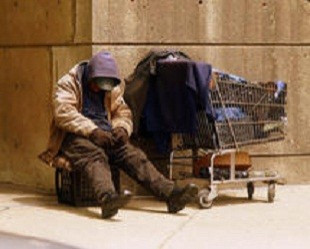One-third of US Homeless People Are Obese, Says Oxford Study
Cheap, low-nutrient and high calorie food along with inconsistent food intake habits are blamed for obesity among the US homeless people, according to a new research.

A new study has found out that one-third of US homeless people are obese probably because of cheap foods that they eat which often contain high levels of fats and sugars.
Researchers from the Oxford University and the Harvard Medical School have found that obesity is very common among the homeless as it is among the general non-homeless population.
Scientists attribute the cause of this phenomenon to the instantly satisfying food with high calorie content. Another reason could be that bodies experiencing chronic food shortages adapt by storing fat reserves.
Researchers had conducted a study on 5,632 homeless men and women in Boston. They had collected medical records at 80 hospital and shelter sites for the homeless in Boston, using data from the Boston Health Care for the Homeless Program, which is one of the largest adult homeless study populations.
They found that just 1.6 percent were 'underweight' whereas one-third of them were classed as morbidly obese. Morbidly obese are referred to people who have 50 to 100 percent or 100 pounds above their ideal body weight.
The authors also compared the BMI of the US homeless adults with 5,555 non-homeless adults, using data from the National Health and Nutrition Examination Survey. They found that obesity amongst the homeless (32.3 percent) was almost as high as among the general population (33.7 percent).
The mean BMI among homeless adults was 28.4 kg per metre squared compared with 28.6 kg per metre squared among the general non-homeless population. However, homeless women had a significantly higher percentage of obesity than non-homeless women.
This study highlights the importance of the quality, as well as the quantity, of food that the homeless are consuming.
"This research shows that this paradox may affect homeless people as well. Obesity among the homeless population could be due to the tendency to buy cheap, low-nutrient dense but highly caloric foods in the setting of limited resources. Another factor could be the physiological changes that occur in the body in the face of inconsistent food intake," said Katherine Koh, researcher at the University of Oxford, in a statement.
"To our knowledge, this is the first study to rigorously evaluate whether obesity is a problem among the homeless in the US as very little research has been done in this area. This study highlights the importance of the quality, as well as the quantity, of food that the homeless are consuming," said Paul Montgomery, Professor of Psycho-Social Interventions at the University of Oxford, in a statement.
© Copyright IBTimes 2025. All rights reserved.





















